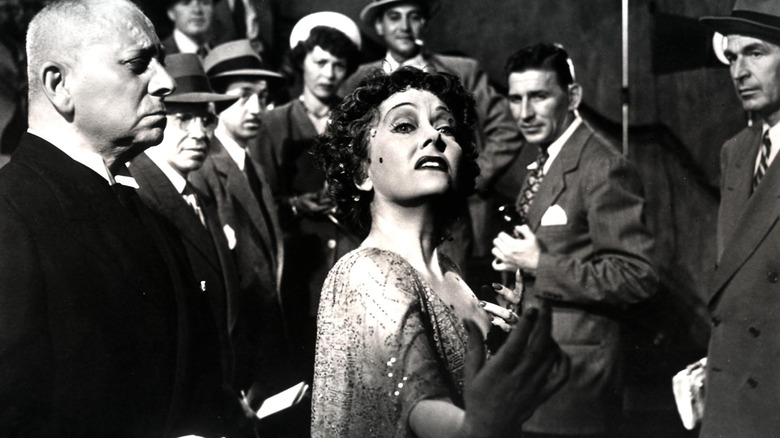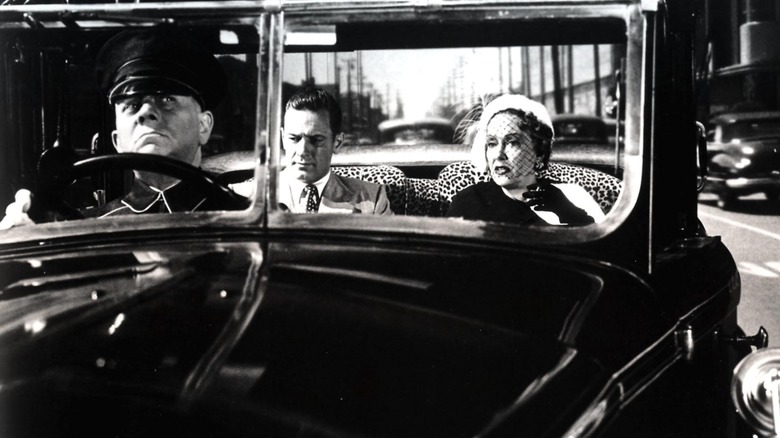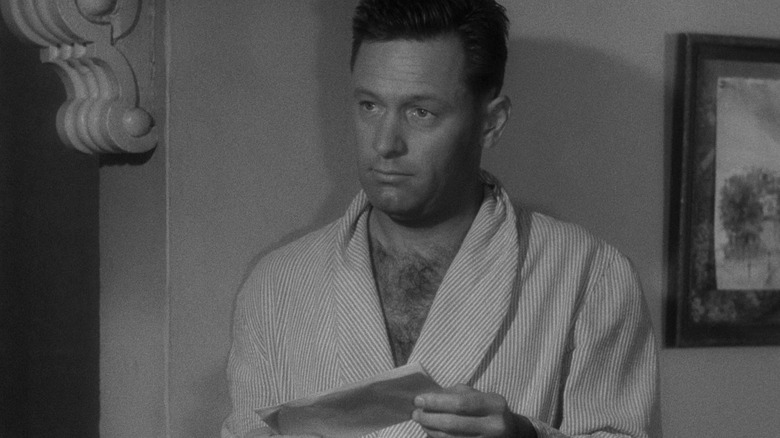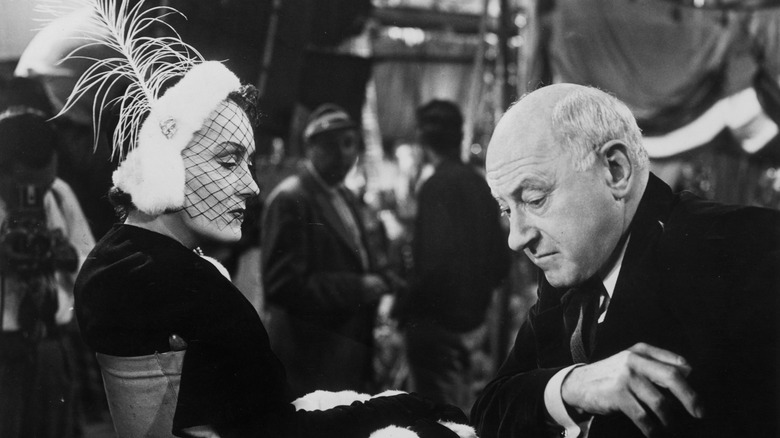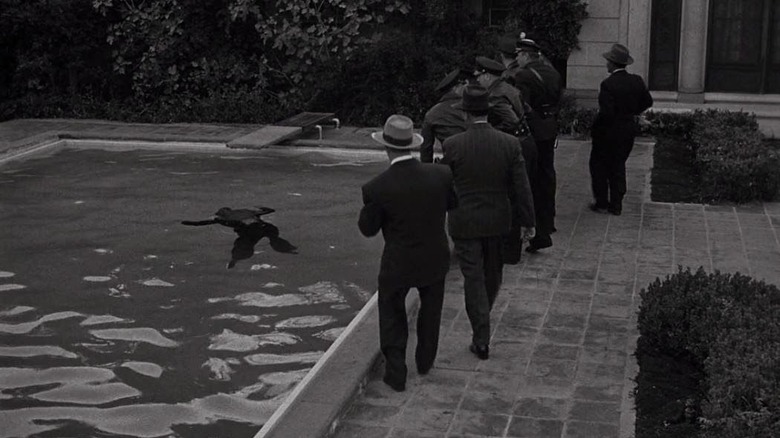Sunset Boulevard Ending Explained: Hollywood Is Always Hungry For The Next Big Thing
Hollywood doesn't treat its own very well.
In Billy Wilder's 1950 classic "Sunset Boulevard," Hollywood is a bleak, shadowy monster with the appetite of a hyena and the memory of a goldfish. Purportedly a city of glamour and dreams, it is in fact the world's most horrid meat factory, designed to grind every ounce of talent out of hard-working artists and ambitious young writers, and then show little gratitude when said artists work themselves to death. It is eternally a town of "What have you done for me lately?"
There is no greater symbol for Hollywood's tendency to dispose of its talent than Norma Desmond, the aging Miss Havisham-like silent film star who, holed up in her aging mansion, dreams of making a comeback to an industry that has long forgotten about her. As played by Gloria Swanson, Norma Desmond is one of cinema's great creations, ironically adding an icon into the Hollywood myth machine while serving the function of trying to choke and interrupt it. In "Sunset Boulevard," as in life, the only function an aging star can have in the alimentary canal of fame is as tabloid fodder. Audiences may not want to see your movies, but they'll happily watch TMZ episodes about your drunken spree, financial troubles, or, as depicted in "Sunset Boulevard," murder scandals.
This is the cynical spine of "Sunset Boulevard."
I'm a Writer, But Then, Nobody's Perfect
Norma Desmond, of course, wasn't invented out of whole cloth by "Sunset Boulevard" screenwriters Billy Wilder, Charles Brackett, and D.M. Marshman, Jr., but inspired by the real-life experiences of silent film stars who had trouble finding work once sound entered the pictures. Mary Pickford, Pola Negri, and Greta Garbo all became secretive and reclusive in the 1930s, and actresses like Clara Bow and Mae Murray struggled with mental health during their careers, some have said intensified by their mistreatment by the Hollywood system (via The Guardian). Aging was seen as a bad career decision for women in Hollywood, and if you did it, you were essentially shown the door or actively kicked out. Norma Desmond may have been named after Norma Talmadge, best known for "Smilin' Through" (1922) and "The Lady" (1925). Whatever the specific inspiration, Norma is the stand-in for every Hollywood actress that was victimized by broken promises and brusque expulsion, and became an icon of L.A.'s unjustly forgotten.
Even the title, "Sunset Boulevard," has a whiff of a bygone era. While Hollywood Blvd. was better known as the seat of the film industry in 1950, the Los Angeles film industry actually began on Sunset Blvd. in 1911 when the Nestor Film Company moved from New Jersey to an office at the corner of Sunset Blvd. and Gower Street, setting up the city's first permanent film studio. (There's a Denny's on that corner now.)
Wilder, Brackett, and Marshman wanted to make a critique of Hollywood, exposing the cynicism and horror that lies beneath the opulence and fame. As they knew from years of experience, screenwriters who work in Hollywood weren't glamorous artists, but word-producing meat bots who were locked into tiny writing coffins, ordered to write more, more, MORE. The production machine mutated the craft of writing from a creative endeavor to a content factory.
Revenge of the Fallen
The story of "Sunset Boulevard" follows a screenwriter named Joe Gillis (William Holden) narrating the events of the film from beyond the grave. We first see him floating dead in a swimming pool, and his voiceover recounts how, while fleeing repo men, he accidentally pulled into a driveway on the eponymous street, only to find himself at the mansion of Norma Desmond (Gloria Swanson), a former silent film star who has been hiding inside her home for decades with her loyal manservant Max (legendary film director Erich von Stroheim) and her recently deceased pet monkey. Joe reveals he's a screenwriter, and Norma immediately hires him to work on a script that will signal her return to Hollywood and to fame. Joe sees no hope in Desmond's return, but needs a place to hide and offers himself as a kept man. When Norma begins imaging a pseudo-romance between them, he kind of goes along with it. He writes while she has parties with other old friends from the silent films days (including Buster Keaton, Anna Q. Nilsson, and H.B. Warner, all playing themselves), and watches her old movies.
It's certainly notable that von Stroheim directed Swanson in a 1928 film called "Queen Kelly," and that he also had trouble finding directing work in the sound era. This was after directing 1925's "Greed," one of Hollywood's largest-ever productions (and one of the longest-ever at a reported nine-and-a-half hours, although most of that is lost now), and eventually becoming an actor, often playing Nazis and other villains. When Norma Desmond and Max screen a clip of "Queen Kelly" for Joe, it's not just the characters looking back at their former glory. Other real-life appearances are peppered throughout "Sunset Boulevard" as well — most notably Cecil B. De Mille, who calls Norma Swanson "little fellow," his real-life nickname for Swanson. Von Stroheim plays a character named Max Meyerling, but it may as well have been his own name, given how it's eventually revealed that his character was once a great silent film director.
Ready for My Closeup
Gloria Swanson (who was only 50 years old at the time) plays Norma as comedically large, yet still within the bounds of Hollywood's melodramatic reality. She understands how fame can warp an actor's mind, presenting Norma as someone who is always in a constant state of performance, always "on." We believe her when she delivers one of the most famous lines in Hollywood history: "I am big!" she says when confronted by her has-been status. "It's the pictures that got small!"
Time has passed, but Hollywood time moves faster than in the real world.
To speed through the machinations of the plot: Joe finds himself collaborating with a young hotshot screenwriter named Betty (Nancy Olson) back in town, and they strike up a friendship with some romantic underpinnings. Joe cannot reveal where he's been hiding out, partly because he's embarrassed to be a kept man, and partly because he might be embarrassed about how much he likes Norma. When Norma finds a screenplay that Joe and Betty have been working on together, and after learning some hard truths from Betty — her fan mail, for instance, is artificially inflated by Max, who is actually her ex-husband (!!) — Norma threatens to commit suicide. Joe belittles her threat as histrionics, and she shoots him, which leads us back to the first moments of the story.
In the final scenes where news cameras infiltrate her mansion to address the crime, something in Norma snaps. She casts her mind into the past, and the news cameras become the cameras filming a production of "Salome." She exits her room in character, convinced she is on the set of an old Hollywood production. She's ready for her close-up. These scenes have been in a million movie montages, but pay close attention to von Stroheim in this sequence, and how Max loves Norma enough to indulge in her fantasies. He even steps in as the ersatz De Mille as she exits her dressing room.
Hollywood Kills
Wilder wasn't willing to let Hollywood off the hook in any capacity. Entrance into the Hollywood machine leads to madness and death, a message conveyed by people with long careers and time spent living at different levels of fame. "Sunset Boulevard" is about the mechanics of the illusion factory. Cinephiles and film fans like to attach romance to their medium of choice, pretending there's something glorious and epic at work in Hollywood, that the town is driven by hard-working auteurs, caring executives, and corporations that love them. We tend to forget that behind every film we love is a mountain of frustration, and behind every star is a conjoined Gabriel of encroaching time, waiting to take over and turn them into monsters for our tabloid amusement. Billy Wilder wanted to implicate Hollywood as brokering the narcotic of myth and what happens when we get addicted. When we forget the workers, we forget the humanity.
Can we break the cycle of addiction? Or will it erase our minds? Looking around, it seems little has changed since 1950.
